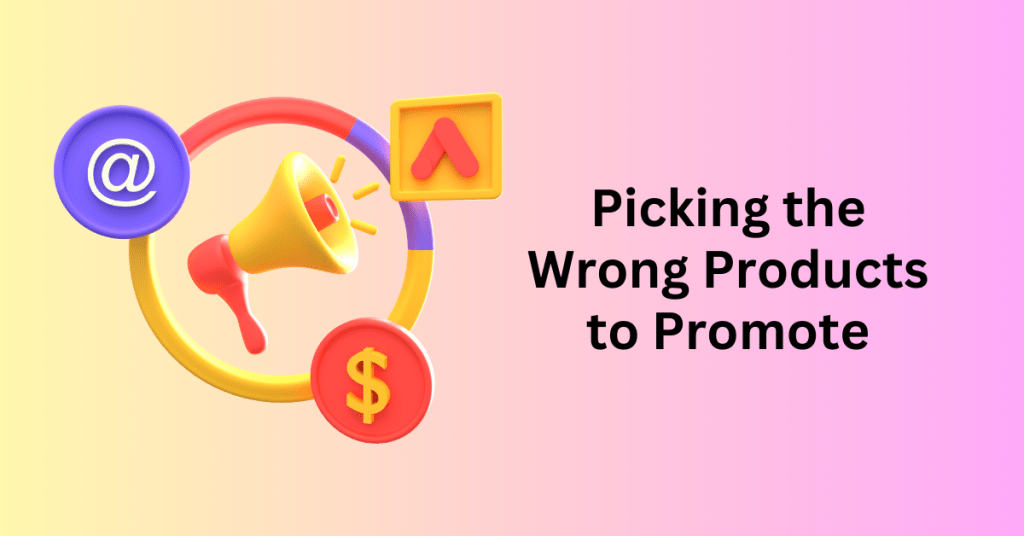Embarking on the journey of affiliate marketing holds immense potential for those seeking to monetize their online presence or supplement their income. However, like any venture, success in affiliate marketing is not guaranteed. There are many Affiliate Marketing Mistakes that marketers make that affect their success.
As affiliate marketing continues to evolve, understanding the intricacies of the industry becomes paramount. This blog serves as a guide for the pitfalls that marketers encounter and insights on how to avoid them.
Whether you’re a novice navigating the affiliate marketing landscape for the first time or a seasoned marketer seeking to enhance your strategies, recognizing and sidestepping these mistakes is instrumental in maximizing your earning potential and building a sustainable affiliate marketing business.
Build Your High Converting Affiliate Funnel
What Is Affiliate Marketing?

Affiliate marketing is a performance-based online marketing strategy where businesses reward individuals or other businesses for driving traffic or sales to their website through the affiliate’s marketing efforts.
This collaborative arrangement is founded on a commission-based model. The affiliates earn a percentage of the revenue generated from the sales or actions resulting from their promotional activities. It’s a symbiotic relationship that benefits both parties. The merchants expand their reach and increase sales, while affiliates earn income without having to create their own products or services.
The core mechanics of affiliate marketing involve a unique tracking link provided to each affiliate. It will allow the merchant to monitor the traffic and conversions generated by their efforts. This tracking link is embedded in the affiliate’s promotional content, such as blog posts, social media posts, or videos. It will enable the merchant to attribute sales or leads back to the specific affiliate responsible.
This transparency is crucial for accurate commission payouts and performance evaluation. Affiliate marketing operates across various industries and niches. It can involve a wide range of products or services, from physical goods to digital products and subscriptions.
As technology continues to advance, affiliate marketing has evolved beyond traditional promotional methods. Affiliates now employ sophisticated digital marketing techniques. This includes SEO, social media marketing, email campaigns, and influencer partnerships, to enhance their promotional reach and effectiveness.
Additionally, affiliate networks and platforms facilitate the connection between merchants and affiliates. It streamlines the management of affiliate programs and ensures a seamless tracking and payment process. The flexibility and accessibility of affiliate marketing make it a popular choice for individuals and businesses looking to generate additional income or expand their online presence.
Build Your High Converting Affiliate Funnel
Advantages of Affiliate Marketing
Passive Income Potential: Affiliate marketing allows marketers to earn passive income by promoting products or services through their online platforms. Once the initial content is created and the affiliate links are in place, marketers can continue to earn commissions without constant active effort.
Diverse Revenue Streams: Marketers can diversify their income streams by promoting products or services across various niches and industries. This diversification minimizes the risk associated with relying on a single source of income, providing a more stable financial foundation.
Low Barrier to Entry: Affiliate marketing is accessible to individuals with various levels of experience and resources. Whether you’re a seasoned digital marketer or a beginner with a social media following, the low barrier to entry allows anyone to participate in affiliate marketing and potentially generate income.
Flexible Work Schedule: Marketers have the flexibility to choose when and how much time they dedicate to their affiliate marketing efforts. This flexibility is especially beneficial for those who want to pursue affiliate marketing alongside other commitments or businesses.
Disadvantages of Affiliate Marketing
Income Variability: Affiliate marketing income can be inconsistent, and there’s no guarantee of steady revenue. Marketers might experience fluctuations in earnings, depending on factors such as seasonality, product demand, or changes in consumer behaviour.
Dependency on Affiliate Programs: Marketers are reliant on the success and integrity of the affiliate programs they join. If a program is poorly managed, has low-quality products, or fails to provide timely payments, it can negatively impact the marketer’s reputation and financial stability.
Competitive Landscape: The popularity of affiliate marketing means there’s significant competition among marketers vying for the attention of the same audience. Standing out in a crowded market requires strategic planning, high-quality content, and effective marketing techniques.
Potential for Unethical Practices: Some marketers may resort to unethical practices, such as false advertising or spamming, to boost their affiliate income. Engaging in such activities not only harms the reputation of the marketer but can also lead to penalties from affiliate programs or legal consequences.
Build Your High Converting Affiliate Funnel
Why am I Not Making Enough with Affiliate Marketing?

If you find yourself not making enough with affiliate marketing, several mistakes may contribute to this. Understanding these issues can help you optimize your approach and improve your affiliate marketing earnings.
Firstly, consider the relevance and alignment between the products or services you’re promoting and your target audience. If there’s a mismatch, your audience may not find value in the promoted products. This will lead to lower conversion rates.
You should instead, analyze your audience’s needs, preferences, and behaviors to ensure that the products you choose to promote resonate with them. Effective affiliate marketing involves building trust with your audience and recommending products that genuinely meet their needs.
Secondly, evaluate the quality of your content and promotional strategies. If your content lacks depth, originality, or fails to provide valuable insights, it may not effectively drive conversions. High-quality content that educates, entertains, or solves a problem for your audience is more likely to encourage them to take the desired action.
Additionally, assess the channels through which you promote affiliate products. A diversified and well-executed promotional strategy, including social media, email marketing, and SEO, can significantly impact your affiliate marketing success.
Thirdly, examine the competitiveness of the products or niches you’ve chosen. If you’re promoting products in oversaturated markets, it can be challenging to stand out. Consider exploring niche markets where there’s less competition but still a demand for relevant products. You may conduct thorough keyword research and market analysis to identify untapped opportunities that align with your expertise and audience interests.
Lastly, scrutinize the affiliate programs you’ve joined. Some programs may offer lower commission rates, restrictive terms, or subpar tracking and reporting systems. Choosing reputable and well-established affiliate programs with fair commission structures and transparent tracking mechanisms is essential.
Mistake 1: Picking the Wrong Products to Promote

As an affiliate marketer, one of the Affiliate Marketing Mistakes to avoid is picking the wrong product to promote. Whether you are just starting out or have built huge followers, you need to pick the product that resonates with your audience.
Besides, you need to ensure that the product is in demand. If you pick a product that no one is interested in, then there is no point in promoting it. This is why, verifying the product is important. You can have a research on the sales volume and review of the product to understand whether people are buying it or not.
You can create the most convincing and viral content, but if the sales page or the affiliate product is bad, you won’t be getting sales either. In addition, you are going to lose trust with your audiences by promoting low-quality products.
In affiliate marketing, people are talking about promoting high-ticket products as it will increase your earnings. But then, the more expensive the product, the more value you need to provide. And it’s also harder to sell high-ticket products directly if your audiences are new to you. You should instead, start with low-ticket products to build relationships and trust with them, then upsell them with high-ticket products when you gain trust.
Besides, when you are promoting new products, it should not be something totally new to your customers. It should be relevant to your niche and ordinary content so people will go ahead and buy it.
Build Your High Converting Affiliate Funnel
Mistake 2: Publishing Low-Quality Content

Publishing low-quality content is another Affiliate Marketing Mistakes that can have severe consequences for your affiliate marketing business, impacting both your credibility and your ability to generate revenue. Quality content is the cornerstone of successful affiliate marketing, as it serves to inform, engage, and persuade your audience.
Firstly, low-quality content diminishes your authority and trustworthiness. In the competitive landscape of affiliate marketing, building a relationship of trust with your audience is paramount. If your audience perceives your content as shallow, inaccurate, or poorly researched, they are less likely to trust your recommendations. Trust is the currency of affiliate marketing, and without it, your ability to influence purchasing decisions diminishes significantly.
Secondly, poor-quality content may lead to a lack of audience engagement. If your content fails to captivate or add value, visitors are less likely to spend time on your website or engage with your promotional materials. This reduced engagement directly affects your conversion rates, as visitors are unlikely to take action, such as clicking on affiliate links or making purchases.
Thirdly, search engines prioritize high-quality content in their algorithms. If your content is deemed low-quality, it may affect your search engine rankings. Lower rankings mean reduced visibility, making it harder for your target audience to find your content. This can result in decreased organic traffic, limiting the overall reach and impact of your affiliate marketing efforts.
Finally, the negative impact on your reputation can extend to your relationships with affiliate programs and merchants. If your audience has a negative experience with products or services you’ve recommended due to the low quality of your content, it can lead to increased refund rates and customer dissatisfaction. Affiliate programs may terminate partnerships with marketers whose promotional efforts result in a negative impact on their brand.
Mistake 3: Ignoring SEO

Ignoring SEO (Search Engine Optimization) can significantly hinder the success and growth of your affiliate marketing business. It’s one of the mistakes you want to avoid in your affiliate marketing business. SEO plays a crucial role in driving organic traffic to your website, increasing your visibility in search engine results, and ultimately influencing the effectiveness of your affiliate marketing efforts.
Firstly, neglecting SEO means missing out on a substantial source of free and targeted traffic. Many users turn to search engines like Google and YouTube when looking for information, products, or solutions. If your website and content are not optimized for search engines, you’re likely to rank lower in search results. This will reduce the chances of attracting potential customers interested in the products or services you’re promoting through affiliate links.
Secondly, SEO is instrumental in establishing the credibility and trustworthiness of your affiliate marketing platform. Search engines consider factors such as the relevance, quality, and authority of your content when determining rankings.
Thirdly, effective SEO practices contribute to a positive user experience. Search engines favour well-structured, user-friendly, and optimized websites for various devices. If your website is not optimized, visitors may experience slow loading times, difficulty navigating, or a lack of mobile responsiveness. A poor user experience can lead to higher bounce rates and lower engagement, directly affecting your ability to convert visitors into affiliate sales.
Lastly, ignoring SEO may limit your ability to compete effectively in the affiliate marketing landscape. In a highly competitive environment, a strong online presence is crucial. Without proper SEO, your competitors who invest in optimization strategies are likely to surpass you in search rankings, gaining a competitive edge and capturing a larger share of the target audience.
Build Your High Converting Affiliate Funnel
Mistake 4: Poor Landing Page Design

The design of your landing page plays a critical role in the success of your affiliate marketing business. A poor landing page design can have detrimental effects on your conversion rates and overall performance. The landing page is often the first point of interaction between your audience and the products or services you’re promoting. It is a crucial element in the affiliate marketing funnel.
Firstly, a poorly designed landing page can lead to high bounce rates. Your potential customers will quickly leave the page without taking any action. If the layout is confusing, the content is unclear, or the page is visually unappealing, users are less likely to engage with the content and click on your affiliate links.
Besides, clear and persuasive messaging is essential to convince visitors of the value of the affiliate products. It can also encourage them to take the desired action. If your landing page lacks compelling copy, persuasive visuals, or a strong call-to-action, it can hinder your ability to convert visitors into affiliate sales.
Secondly, you need to have a lead magnet and contact form to capture their contact details. This is very important as you want to follow up with them if they don’t buy on the first attempt. People usually need more persuasion to take action to complete the purchase. You will need to build trust and relationships to get them to buy from you.
Thirdly, the loading speed of your landing page is crucial. A slow-loading page can frustrate visitors and lead to increased bounce rates. Search engines also consider page speed as a ranking factor. So, a poorly optimized landing page can negatively impact your overall SEO efforts. Also, it will reduce the visibility of your affiliate marketing content in search engine results.
Mistake 5: Copying From Other Websites

Copying content directly from other websites can have severe repercussions for your affiliate marketing business. It will affect your credibility, search engine rankings, and potentially lead to legal consequences. Originality and authenticity are crucial in the online landscape, and copying content undermines these principles, resulting in several negative consequences.
Firstly, copying content harms your credibility and trustworthiness. Audiences value unique and valuable information. If they discover that your content is identical to what they’ve seen elsewhere, they may question your expertise and reliability. Trust is a fundamental aspect of successful affiliate marketing. Compromising it through copied content can lead to a loss of audience trust, impacting your ability to influence purchasing decisions.
Secondly, search engines penalize duplicate content, affecting your website’s rankings. Search algorithms prioritize original and relevant content to provide users with the best possible results. If your content is flagged as duplicate, search engines may choose to rank other, more original sources higher in search results. It will diminish the visibility of your affiliate marketing content and reduce organic traffic to your site.
Lastly, copying content limits your ability to differentiate yourself in a competitive affiliate marketing landscape. Original content allows you to showcase your unique voice, insights, and expertise, helping you stand out among competitors. When you copy content, you forfeit the opportunity to establish a distinctive brand identity and connect with your audience on a personal level. This will hinder your long-term success in the affiliate marketing industry.
Mistake 6: Not Measuring Your Performance

Neglecting to measure and analyze your performance in affiliate marketing can have significant consequences for the success and growth of your business. Performance measurement is essential for understanding the effectiveness of your strategies, optimizing your campaigns, and making informed decisions to maximize your earnings.
Firstly, without performance measurement, you lack insights into what is working and what needs improvement. Affiliate marketing success is heavily reliant on data-driven decision-making. If you’re not tracking key metrics such as click-through rates, conversion rates, and earnings per click, you miss out on valuable information that could guide your strategy adjustments. This lack of insight can result in stagnant or declining performance. You may continue with ineffective tactics without the ability to identify and rectify issues.
Secondly, measuring performance is crucial for evaluating the profitability of different affiliate programs and products. If you’re not analysing the return on investment (ROI) for each promotion, you might invest time and resources in campaigns that yield minimal returns. By measuring performance, you can identify high-performing affiliate programs, optimize your promotional efforts, and allocate resources to activities that generate the most revenue.
Thirdly, performance measurement helps you understand your audience and tailor your strategies accordingly. Analyzing demographic data, user behaviour, and other relevant metrics enables you to create targeted and personalized content. Without this information, you risk delivering generic content that may not resonate with your audience. It will then lead to lower engagement and conversion rates.
Lastly, not measuring performance can hinder your ability to negotiate better terms with affiliate programs. When armed with performance data, you have a stronger case for negotiating higher commission rates or securing exclusive promotions. Failure to demonstrate the value you bring to the affiliate program may result in missed opportunities to increase your earnings potential.
Build Your High Converting Affiliate Funnel
Final Thoughts: 6 Common Affiliate Marketing Mistakes to Avoid
In the world of affiliate marketing, steering clear of common pitfalls is as important as implementing effective strategies. As we explored the six common affiliate marketing mistakes to avoid, it became evident that success in this dynamic field requires a combination of careful planning, strategic thinking, and ongoing adaptation.
In closing, the journey in affiliate marketing is marked by its ever-evolving nature. By steering clear of these common mistakes, you set the stage for a more fruitful and rewarding affiliate marketing experience. Embrace the lessons learned, stay attuned to industry trends, and always prioritize delivering value to your audience. With diligence and a commitment to improvement, you’ll be well on your way to building a successful and sustainable affiliate marketing business.





